It's time we had a serious, adult discussion about cycling's appalling impact on the environment so here are eight achievable proposals
No more pretending that we care; it's time to implement these measures to make an actual difference
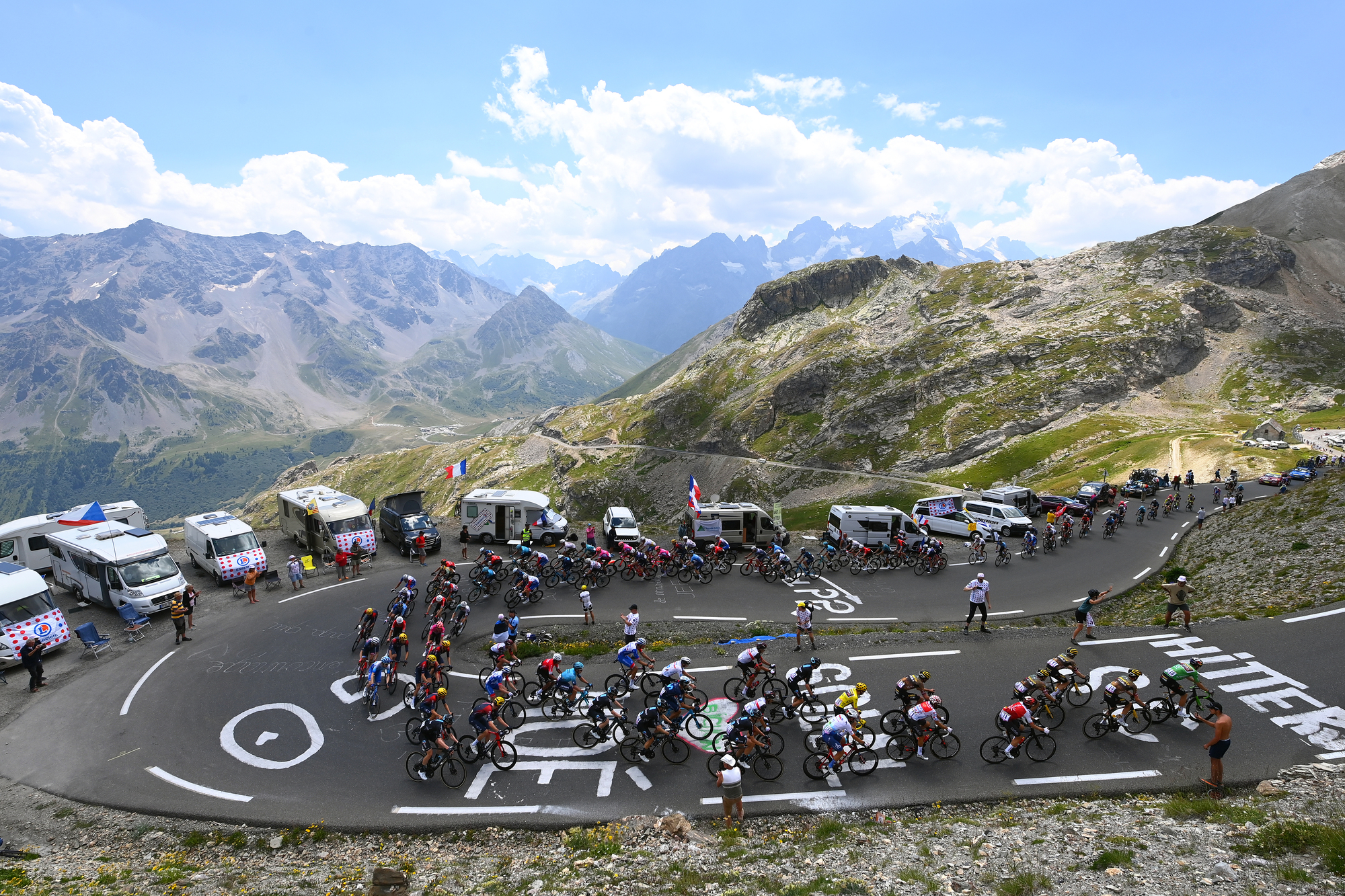

Forget all the token gestures and small green initiatives, cycle racing is doing absolutely nothing to reduce its impact on the climate.
Nothing.
And it's doing nothing because it’s scared of making changes that they fear will affect the spectacle of the sport we all love.
It's utter nonsense, and it needs to change. Not tomorrow, but now.
Professional cycling cannot affect the breakdown of the world. It cannot prevent global heating. But it can definitely - definitely! - do way, way more.
And it needs to, because right now it’s doing almost nothing.
Angry by the empty reservoirs, snowless mountains and arid farms I've seen in the past two months of reporting at races, I've created eight proposals that I think cycling ought to introduce to address its impact on the climate.
Get The Leadout Newsletter
The latest race content, interviews, features, reviews and expert buying guides, direct to your inbox!
Before I get into my propositions, I want to be clear on something: we’re all hypocritical in this debate.
I’ve taken three flights and am approaching 11,000km of driving in the seven weeks of racing that I have covered since March. I, too, am guilty. But this is not about whataboutery, this is about presenting ideas that can put cycling on the right side of the argument.
Ideas that will not affect the spectacle of the sport, that will not damage sponsorships, and that will not make our sport look any different.
Instead, these are attainable changes that will make our sport greener, cleaner and finally have it meaningfully reducing its very sizeable and very unnecessary impact on the climate.
One: solar panels on buses
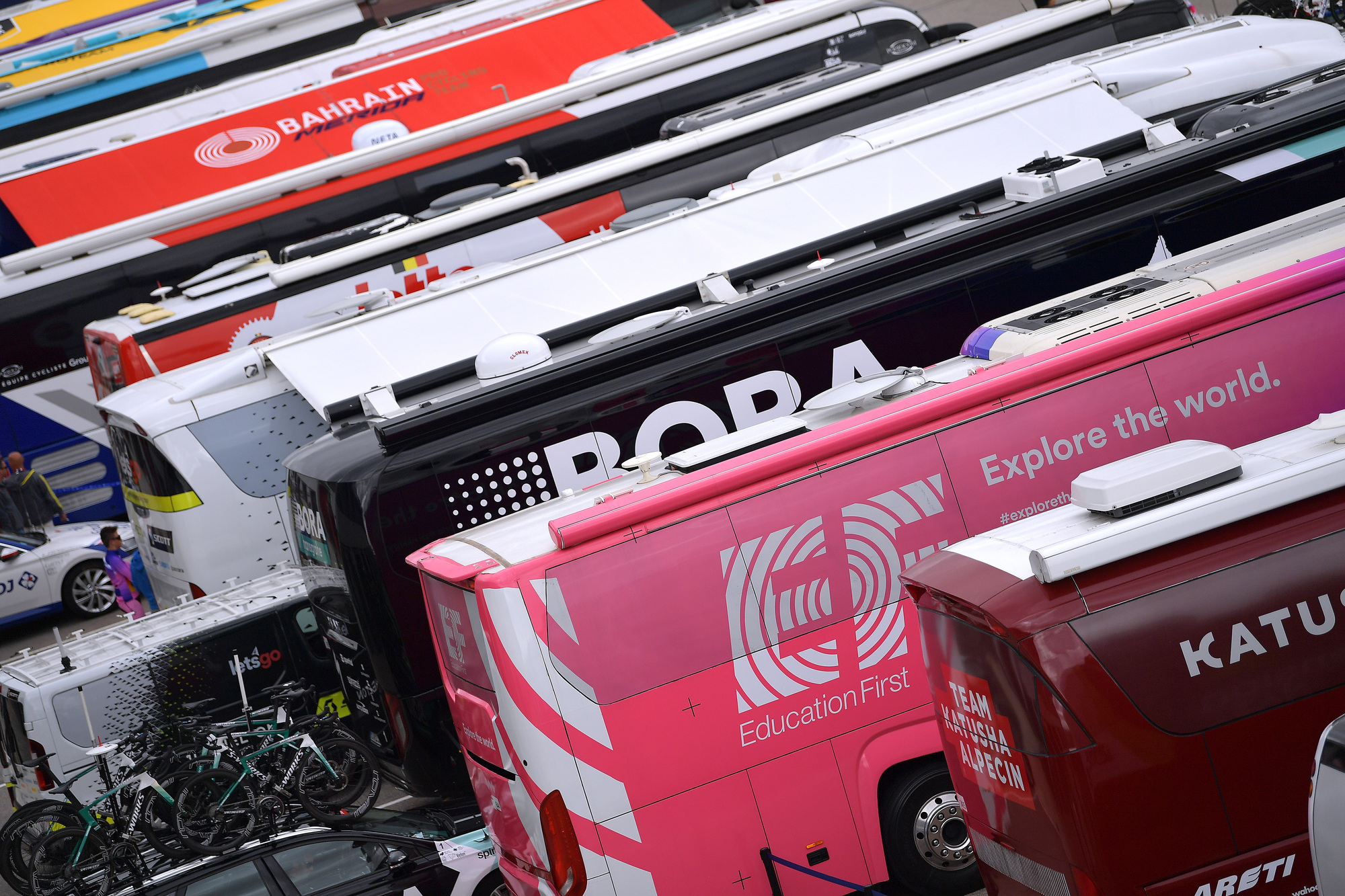
Where are the solar panels?
Cycling teams aren’t going to get rid of their luxury buses, and they’re not going to turn off their washing machines and prevent their riders from each having hot showers and then warming up their post-race meals in the microwave.
Yet teams can still do all of that far more efficiently. At March’s Volta a Catalunya, all 24 team buses were parked below me at one finish, and I had a bird’s eye view of the top of each bus. Only one team, Caja-Rural I think it was, had solar panels fitted.
I converted a van 18 months ago and fitting two 150 watts solar panels, a battery and all other necessary equipment cost me around €450. In an intense Pyrenean snowstorm this winter where my solar panels couldn’t charge for six days because of grey skies, I did not run out of electricity. I could still take a hot shower, keep my fridge on, and do whatever I needed.
You therefore cannot tell me that a cycling team cannot fit at least six 150 watts solar panels onto their team buses and not run all the appliances off them.
There is a cleaner and cheaper alternative to their diesel engines running all of the time.
Two: electrify all team vehicles
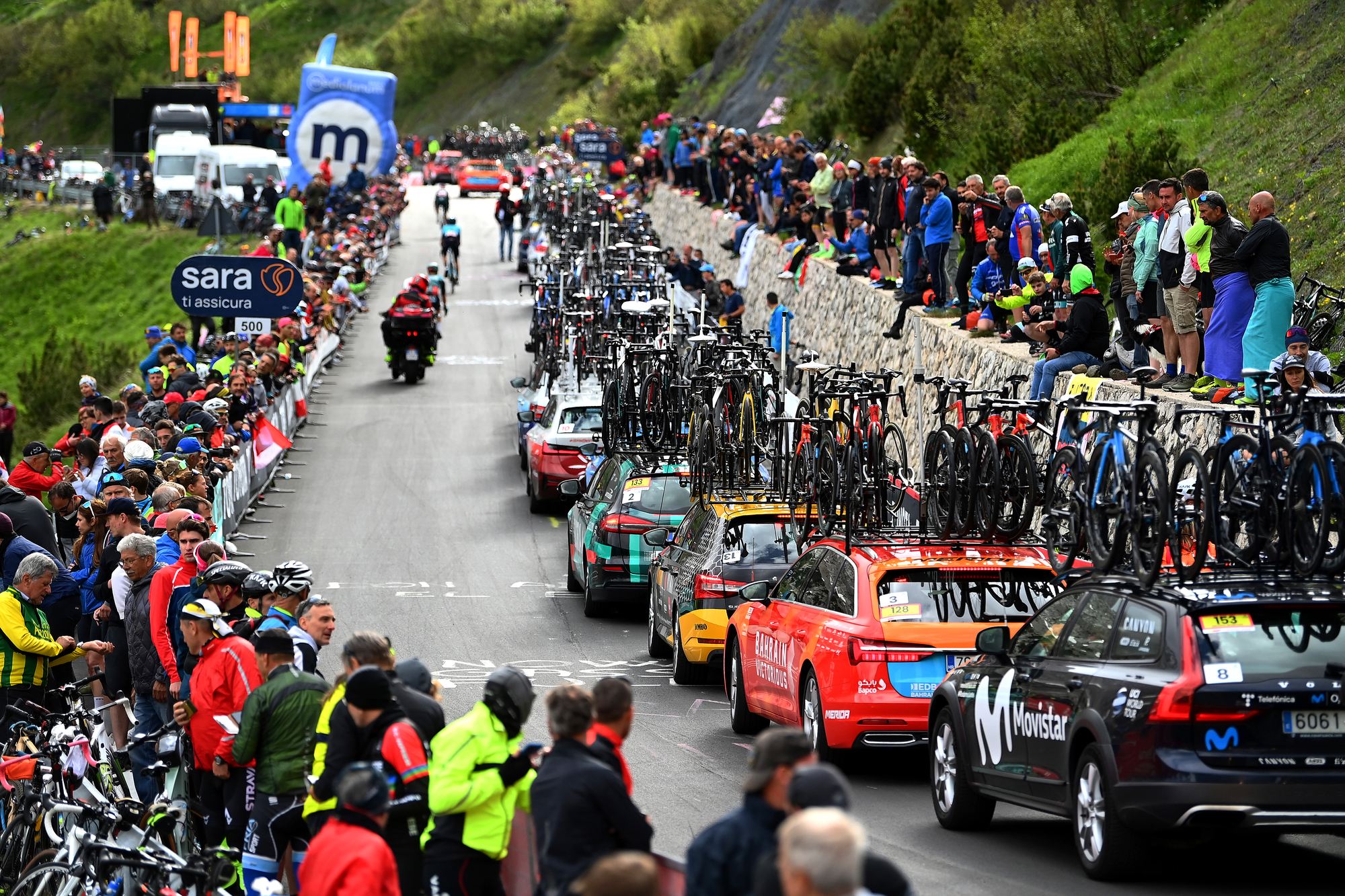
Why can't all these cars be electric?
Whether it’s necessary to have six team cars following a race every day is a separate topic, but cycling needs to implement a rule right now that makes all team vehicles electric (with the exception of the buses, which could be hybrid).
Kudos to the Tour de France and the Vuelta a España for having hybrid race vehicles and installing mobile charging points during stages. If they can do that, they can install portable charging points at every team hotel.
Cycling is not awash with money like other sports, but every team has their vehicles provided by a motor sponsor. All vehicles should be electric. Not in one arbitrary year in the distant future, a date set just to kick the can down the road, but from next season.
People may say that electric vehicles don’t have the capacity to drive for 500km a day. Well, see my next point.
Three: cap the distance between stages
It’s simply not necessary that I drove 410km on stage seven of the Vuelta a España.
We need to introduce a rule that states the non-race route distance between a stage start and finish can be no longer than 100km or one hour of driving. Likewise, the distance between a stage finish and the next day’s start should also not supersede 100km or one hour of driving.
I really don’t need to explain this point much further, but it’s utterly ridiculous the length of driving in one day just to follow a bike race.
To appease race organisers, the rule would include a clause that allows them one day each week when they can double the maximum permitted distance. This would cater for transition days in Grand Tours, for example.
Similarly, it is an absolute disgrace that the distance between stage nine and 10 of the current Vuelta is 900km. The fact that the peloton have to take domestic flights to continue the race, while the rest of the convoy drives for nine hours, is appalling.
Rest days should be capped with a maximum distance of 250km. No-one enjoys massive transfers, and neither are they essential to a race. Let’s get rid of them.
Four: less far-flung foreign starts
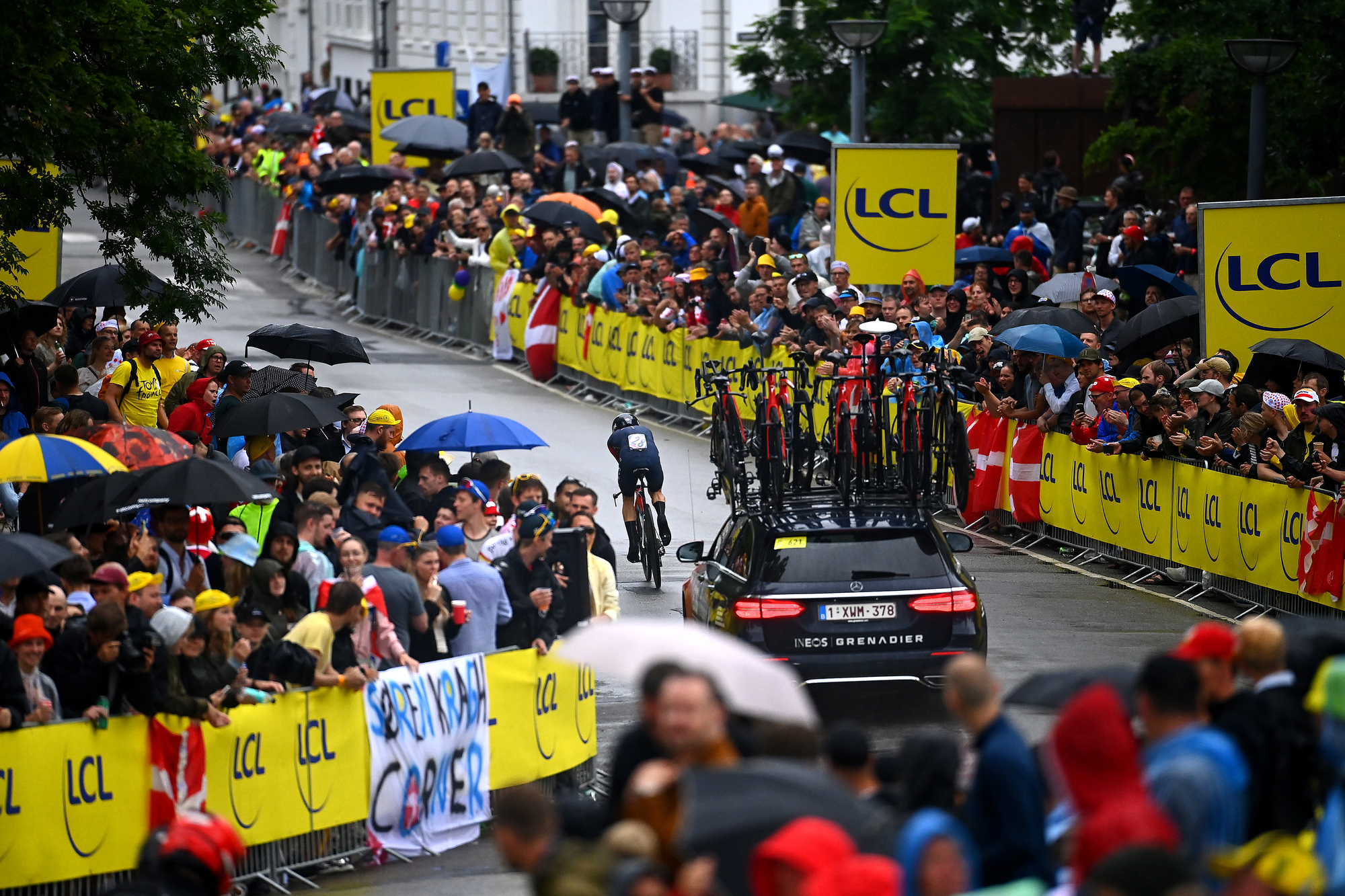
Why do we need every Grand Tour starting far away from home?
This year, each Grand Tour has started in a country far away from its own borders which is fantastic revenue for each race organiser.
I’m not here to be a killjoy and say we ought to prevent foreign starts, but there should be a cap on the amount of grand departs that take place more than 1,000km away from the host nation’s borders.
The Netherlands can still host the Vuelta, and Denmark can still welcome the Tour, but it can only do so once a decade. No more.
If we’re serious about making an impact, we have to look at the huge cost to the climate of moving thousands of people and massive amounts of infrastructure around Europe just for a three day event.
Cycling Weekly understands that the UCI has informed all three Grand Tours that only one of them is permitted a foreign start each year, a rule that will apply from 2023.
Five: introduce a green tax on teams and Grand Tour race organisers
Every team - and Grand Tour race organisers - should have to pay a 5% green tax at the start of the season.
The money would go towards green initiatives that are not limited to offsetting their carbon emissions or planting trees, but can also be used to grow the sport.
A WorldTour team with a budget of €20million would pay €1million in tax in my supposed ruling, money that would be reinvested in green projects. Likewise ASO, organisers of the Tour de France, would be subject to the 5% ruling.
Think, for example, how many city bikes you could buy with that amount of money, city bikes that would be donated to people across the world that would allow them to use the bike as a mode of transport.
I say city bikes because that is what the majority of those who cycle ride. We don’t need more people like ourselves on fancy road bikes, but we do need more people cycling to the shops and to work and to school.
Each city bike doesn’t have to cost a lot - just a few hundred euros or pounds - and teams and races can promote themselves on the bikes, brandishing their own sponsors or logos. It’s free advertising! The person who gets one of the donated bikes might end up supporting the team or race.
No-one likes paying extra tax, but no-one is really enjoying restrictions on water, the excessive heat and wildfires we’re all experiencing around the globe.
The act of riding a bike is the greenest mode of transport in the world. Cycle racing doesn’t do anywhere near enough to promote it. This tax would go some way to make up for that.
Six: shuttle buses to move race personnel around
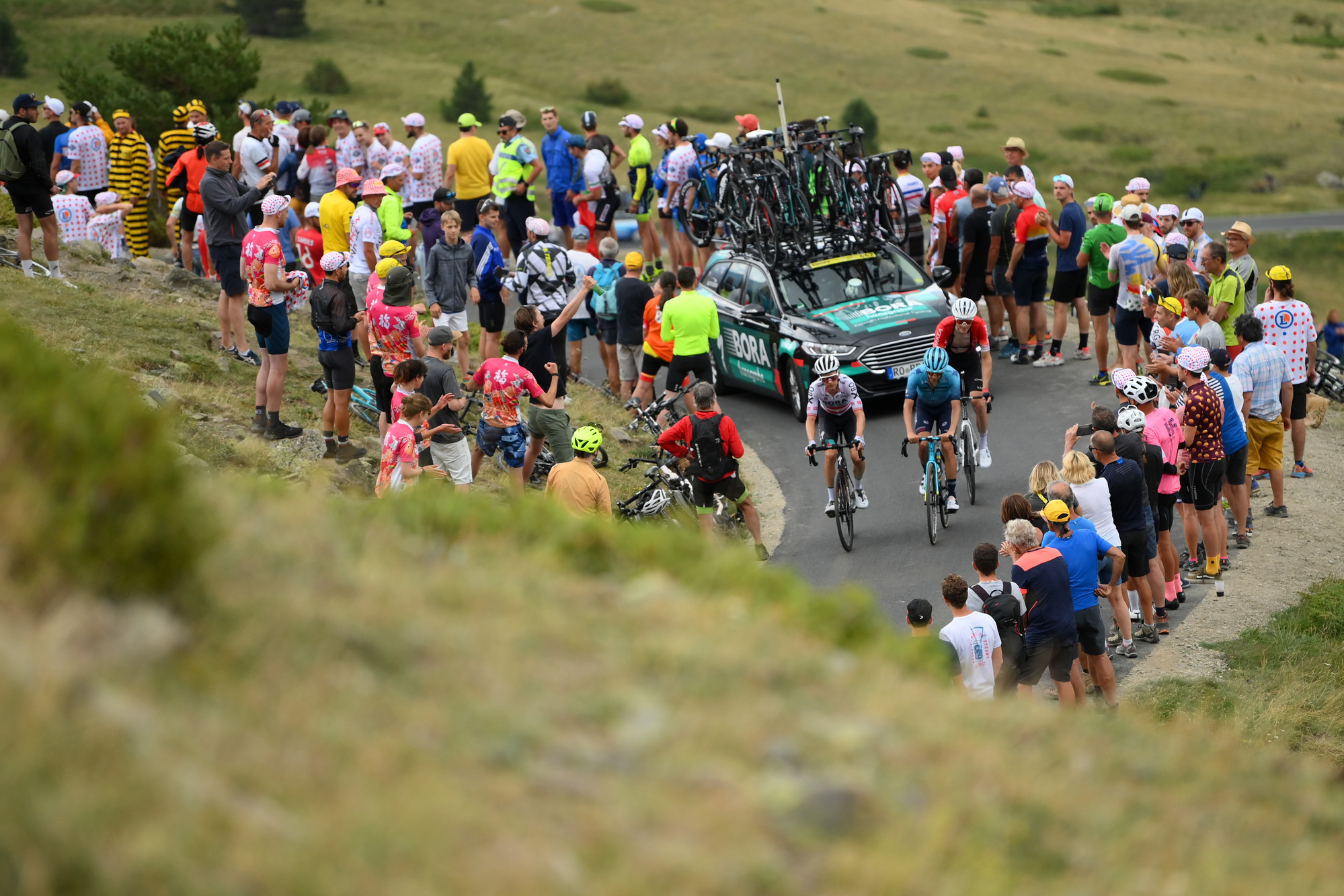
Why do we still allow so many vehicles to drive to the top of mountain passes with limited space?
Back to transport, and races need to do much more to reduce the traffic on climbs.
The Vuelta has an obsession with obscure finishing locations, and it definitely should not change that.
Access to these small, narrow climbs that often lead just to a telegraph pole is restricted, with the amount of cars able to reach the top minimised.
Yet, rather than still allowing one hundred cars up there, all of which will slowly crawl down the mountain later on, races need to introduce shuttle buses to ferry race personnel.
I have seen it in other races - most notably the Tour of the Basque Country - but never in a Grand Tour. Local shuttle buses can ferry passengers every 10 minutes, reducing the traffic and requiring just one vehicle of fuel, as opposed to dozens or hundreds. It’s really that simple.
On a similar note, at the end of a race riders and staff often head straight to the nearest airport before going to their next destination. It’s not uncommon - in fact, it’s the norm - for multiple team vehicles to taxi riders and staff to the airport.
There’s a way better solution: put on several shuttle buses for all riders and staff that will take them from a race finish to the airport
Seven: ground the helicopters
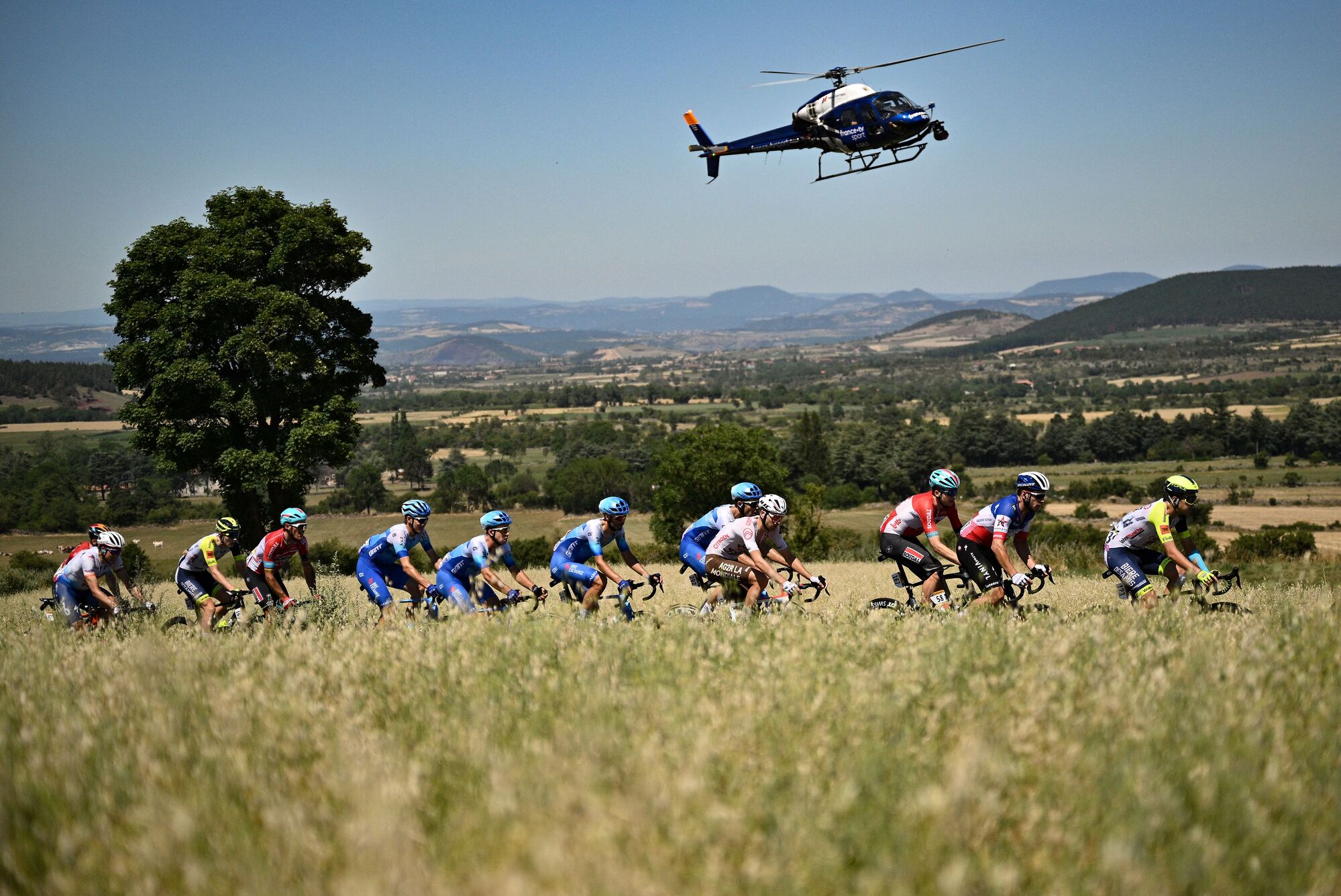
Why do we have to persist with helicopters that burn 90 litres of fuel per hour?
The actual racing has been very poor in Hungary, Denmark and the Netherlands in each of their respective Grand Tour stages, broadcast footage instead relying on helicopters to pick out landmarks and landscapes to excite watching viewers.
There is an alternative to gas-guzzling helicopters: drones.
Criterium races and other sports (in particular downhill and freeride ski racing) have already demonstrated that drones can broadcast live racing, often increasing the quality of spectacle to the viewer at home with interesting angles.
Drones can go very high, too, so that lovely message spelled out by the farmer or those happy kids dancing in the school field can still get on TV, but instead of a helicopter zooming in on them, a drone can fly high and record the exact same image.
Helicopters are not essential anymore. Let’s be brave and embrace modernity.
Eight: change - or bin - the publicity caravans
And finally, the publicity caravans.
The media - me included! - is very guilty of fantasising about the role of the publicity caravan in Grand Tours, pretending that they make dreams happen and that they enhance days.
Honestly, they’re a load of crap. No-one’s day is actually made better for picking up a free Arkéa-Samsic sticker of Connor Swift (sorry, Connor) or collecting a leaflet about houses from Century 21.
Disagree? Think that, actually, yes, we do like the free tat and the polka dot jerseys and caps? Ok, keep your caravan, but get rid of the novelty cars that cannot be driven on an open road so have to be transported on lorries before and after every stage.
The Tour’s caravan is so large that multiple lorries are required to transport melons, washing bottles and houses on cars.
Like everything, there is a solution. If we really must keep the caravan, make the vehicles roadworthy, and electric. We don’t need the lorries.
Conclusion: we must act now
I may come off pretty angry in this piece, and that’s because I am. I love nothing more than riding my bike, but I hate how this year the landscape I am riding in is so parched and arid; I hate that I couldn't see any snow in the Pyrenees in June; I hate that the lakes and reservoirs I pass are so empty.
I am not naive to think that cycle racing can stop the climate crisis, but I’ve been around enough bike races to see that this sport that I love so dearly, that takes place in the most beautiful of landscapes, is doing nothing to address its own impact.
Please change, cycling. Protect the terrain you rely on for your sporting drama. Act now. Because tomorrow's too late.

Thank you for reading 20 articles this month* Join now for unlimited access
Enjoy your first month for just £1 / $1 / €1
*Read 5 free articles per month without a subscription

Join now for unlimited access
Try first month for just £1 / $1 / €1
A freelance sports journalist and podcaster, you'll mostly find Chris's byline attached to news scoops, profile interviews and long reads across a variety of different publications. He has been writing regularly for Cycling Weekly since 2013. In 2024 he released a seven-part podcast documentary, Ghost in the Machine, about motor doping in cycling.
Previously a ski, hiking and cycling guide in the Canadian Rockies and Spanish Pyrenees, he almost certainly holds the record for the most number of interviews conducted from snowy mountains. He lives in Valencia, Spain.
-
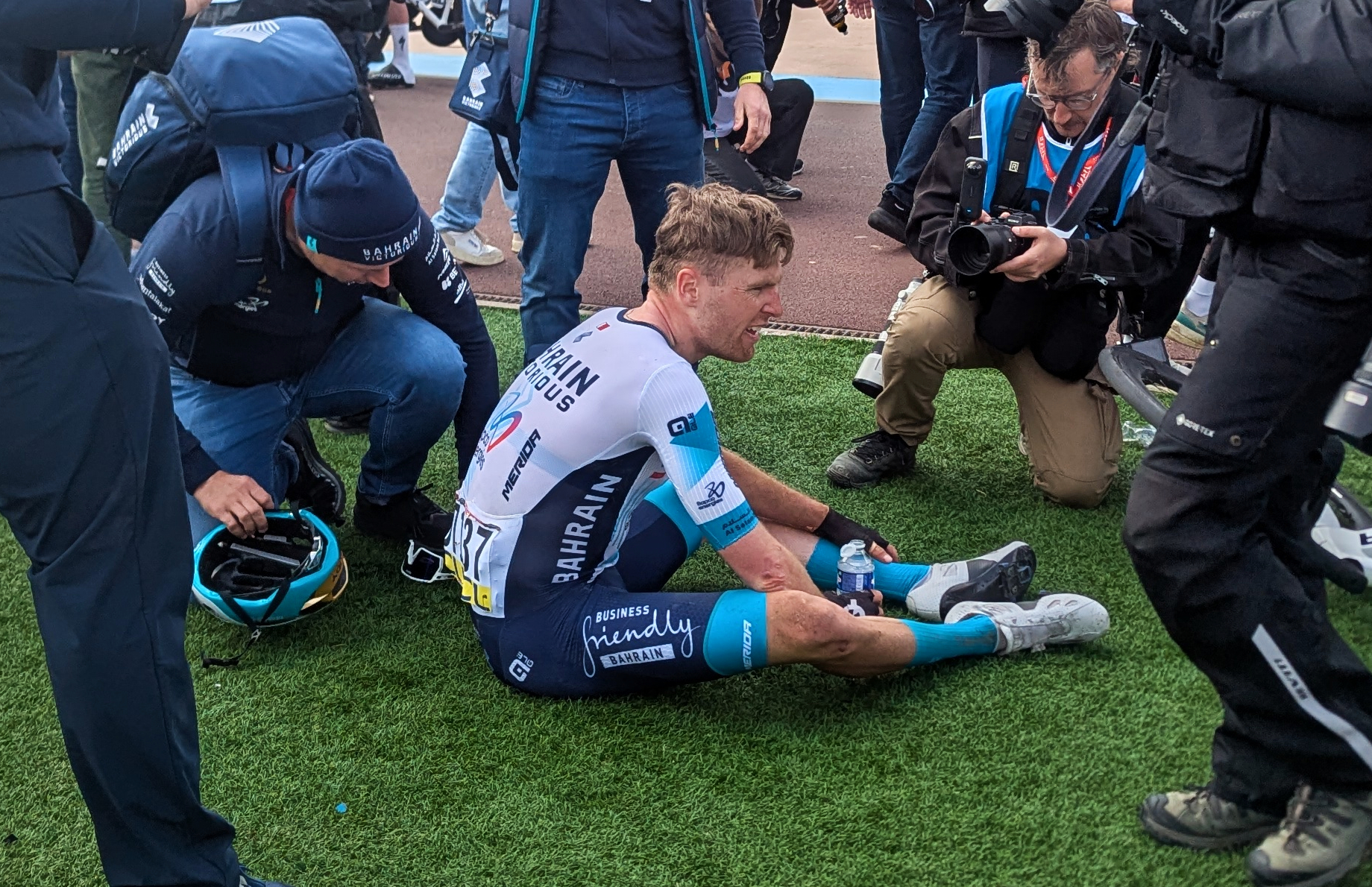 'I'll take a top 10, that's alright in the end' - Fred Wright finishes best of British at Paris-Roubaix
'I'll take a top 10, that's alright in the end' - Fred Wright finishes best of British at Paris-RoubaixBahrain-Victorious rider came back from a mechanical on the Arenberg to place ninth
By Adam Becket Published
-
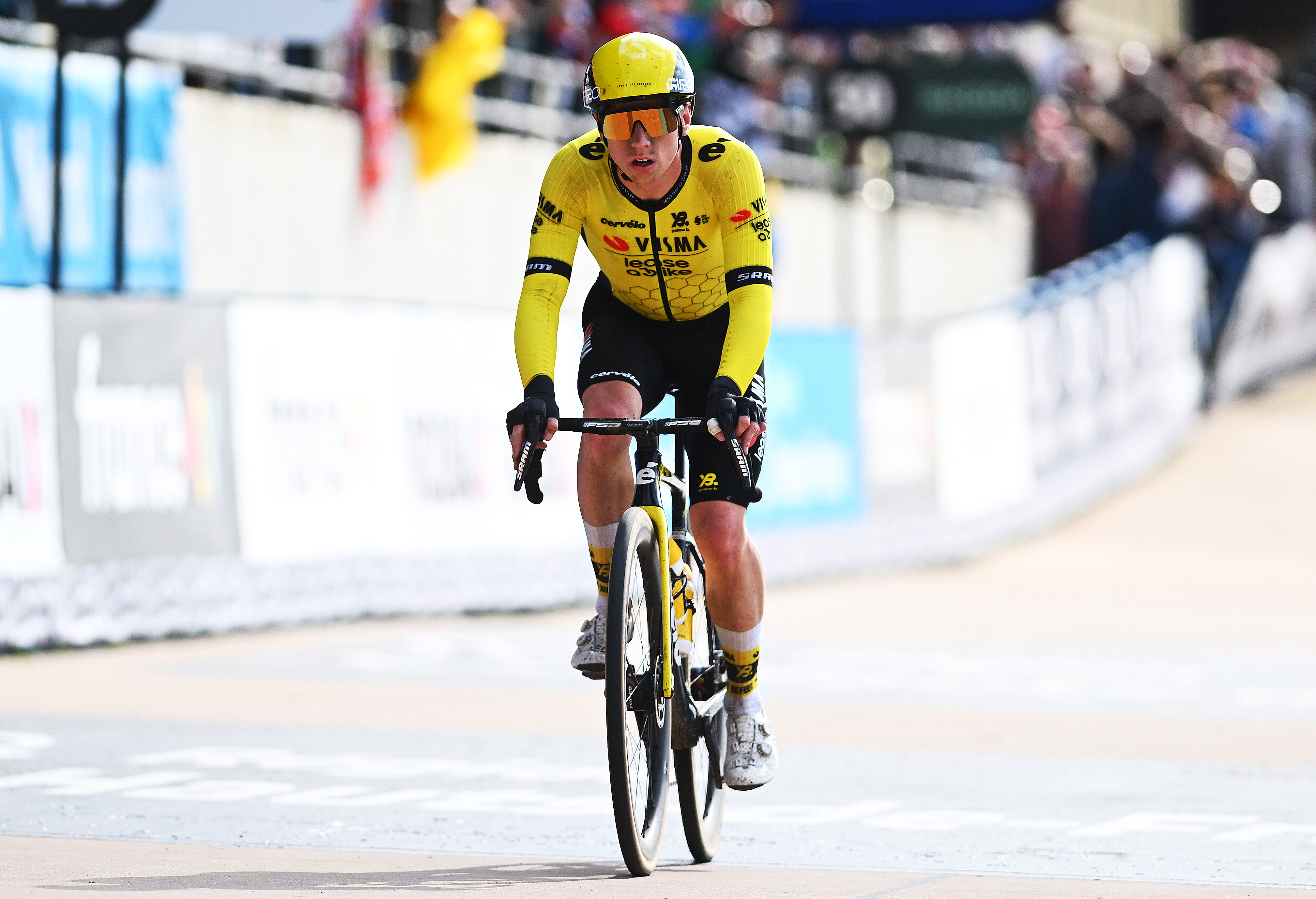 'This is the furthest ride I've actually ever done' - Matthew Brennan lights up Paris-Roubaix at 19 years old
'This is the furthest ride I've actually ever done' - Matthew Brennan lights up Paris-Roubaix at 19 years oldThe day's youngest rider reflects on 'killer' Monument debut
By Tom Davidson Published
-
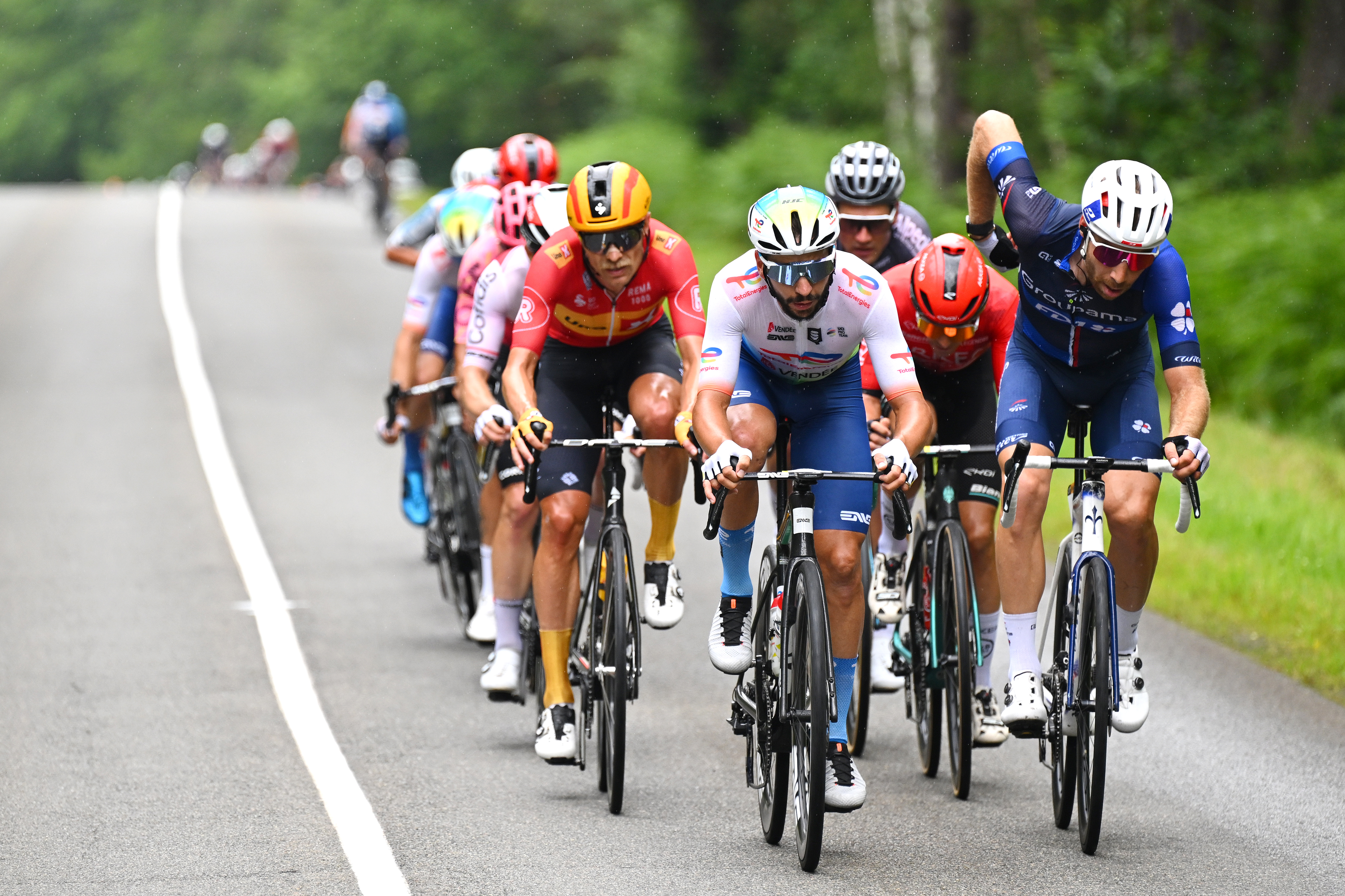 Extra wildcard team approved for Tour de France, Giro d'Italia and Vuelta a España
Extra wildcard team approved for Tour de France, Giro d'Italia and Vuelta a EspañaNumber of teams to increase from 22 to 23 at men's Grand Tours
By Tom Davidson Published
-
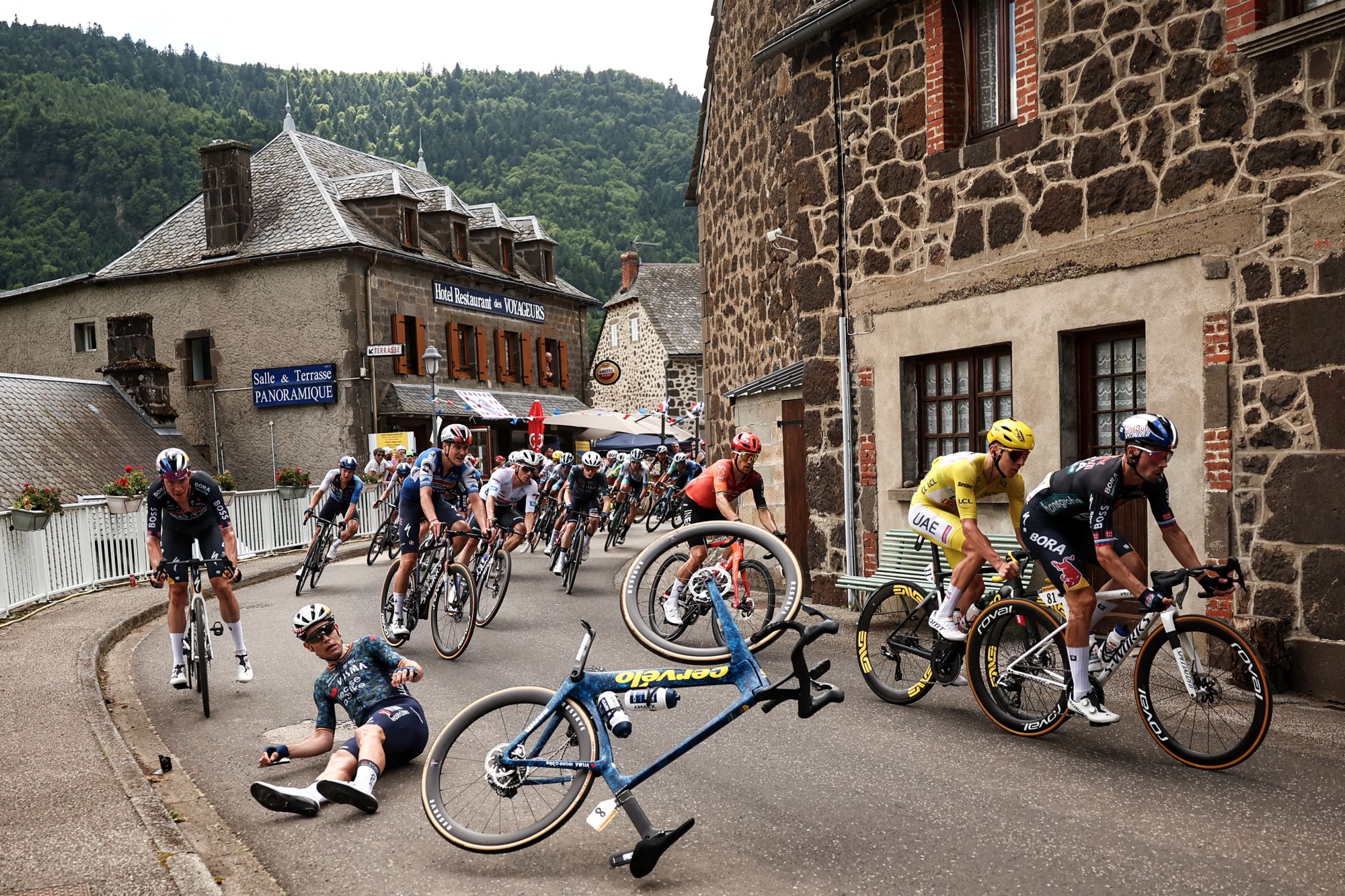 Rider airbags being considered as part of new safety measures from UCI
Rider airbags being considered as part of new safety measures from UCIWorld governing body still undecided on radios, gear restrictions, regulations surrounding rim height and handlebar widths and wider rules in sprint finishes
By Tom Thewlis Published
-
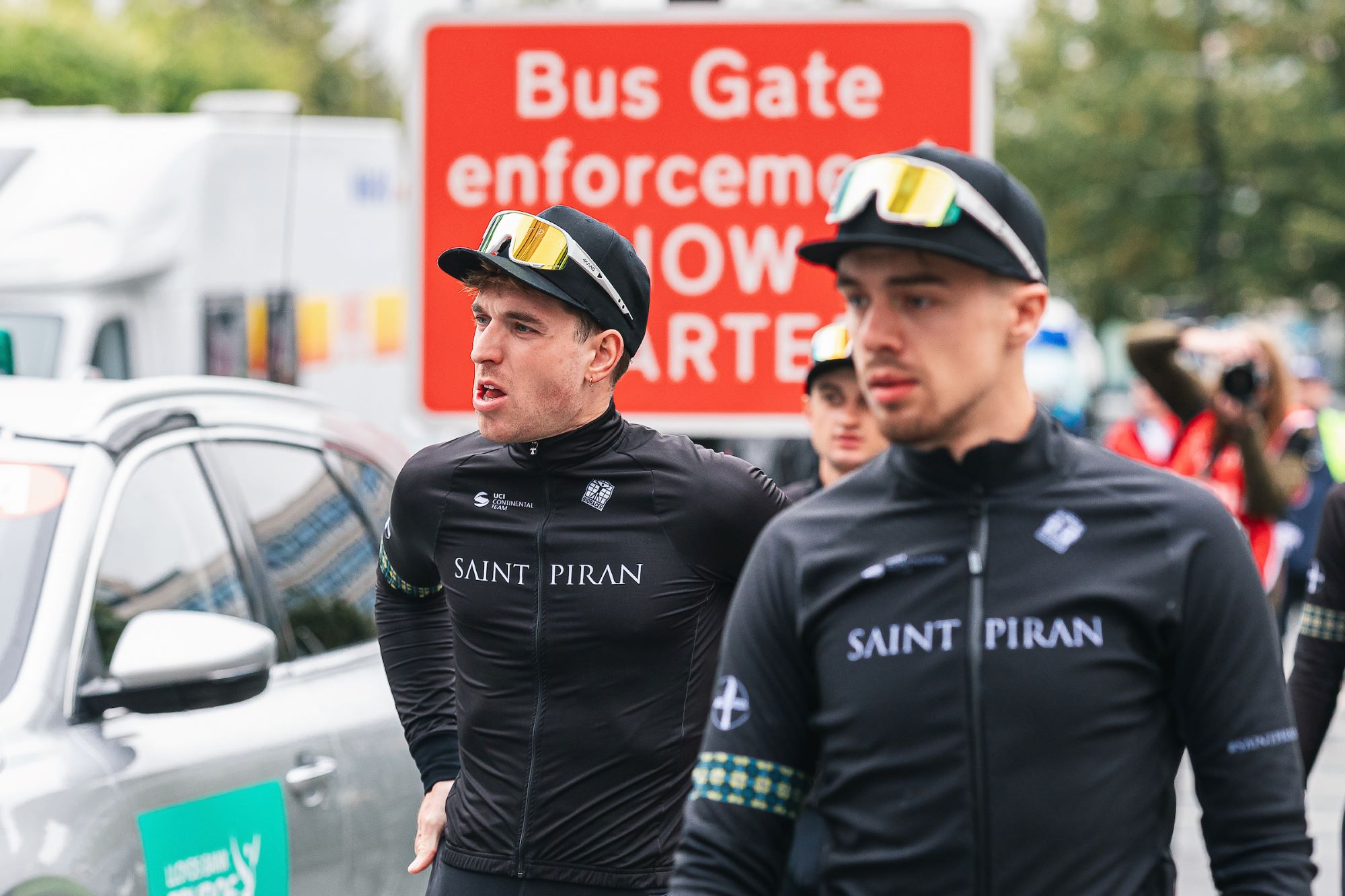 ‘It’s unprofessional and I’m p****d off’: Riders and staff learned of British Continental team’s decision to close via social media
‘It’s unprofessional and I’m p****d off’: Riders and staff learned of British Continental team’s decision to close via social mediaA handful of team personnel only learned on social media that they would not have jobs in 2025 after Saint Piran's demise
By Tom Thewlis Published
-
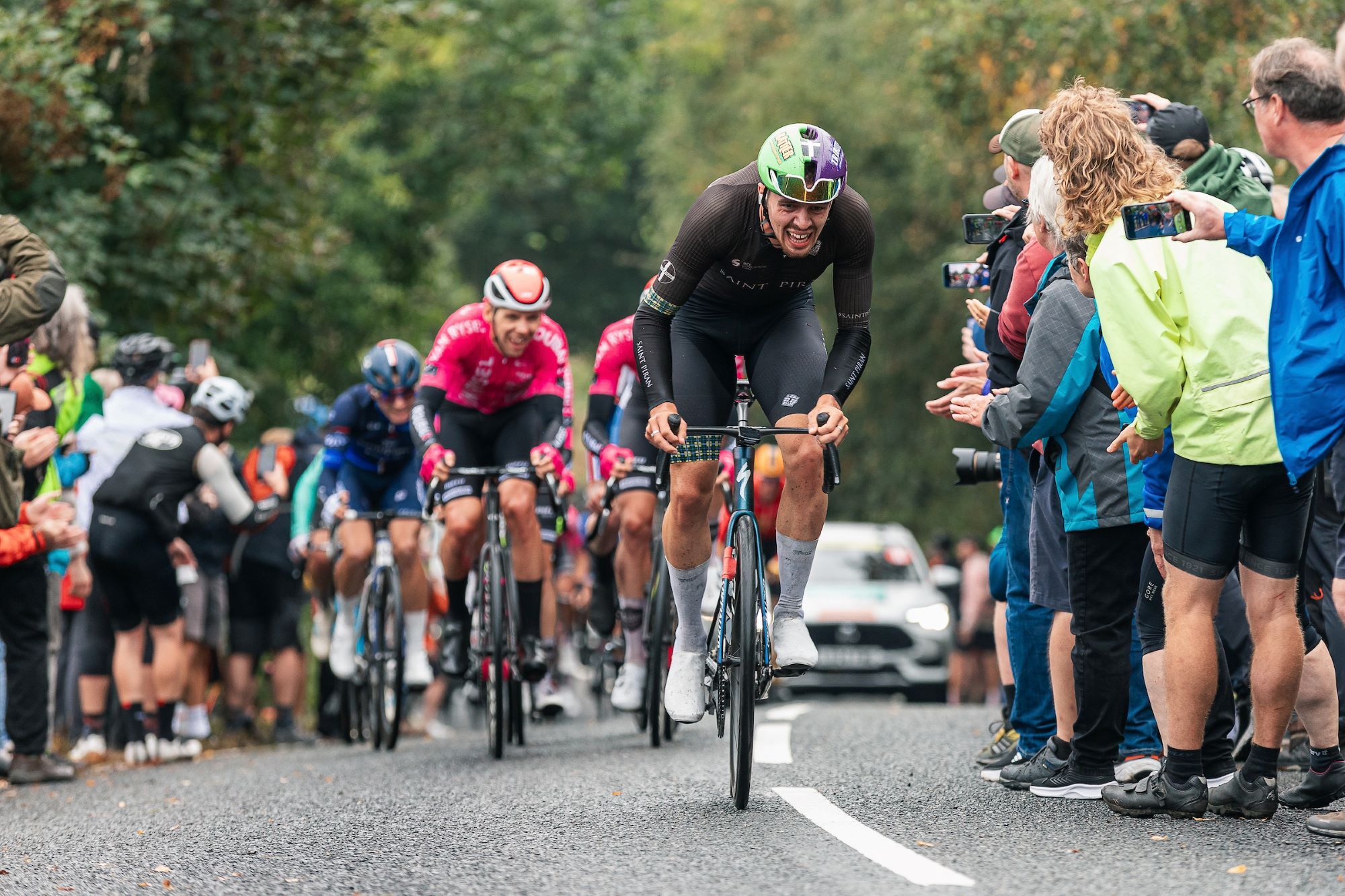 UK team asking athletes to pay £500 for a 'performance test review' as part of application and has insisted riders sign an NDA to join
UK team asking athletes to pay £500 for a 'performance test review' as part of application and has insisted riders sign an NDA to joinBritish Continental team Saint Piran charging hefty fee for data review with no guarantee that applicants will get a place on the team
By Tom Thewlis Published
-
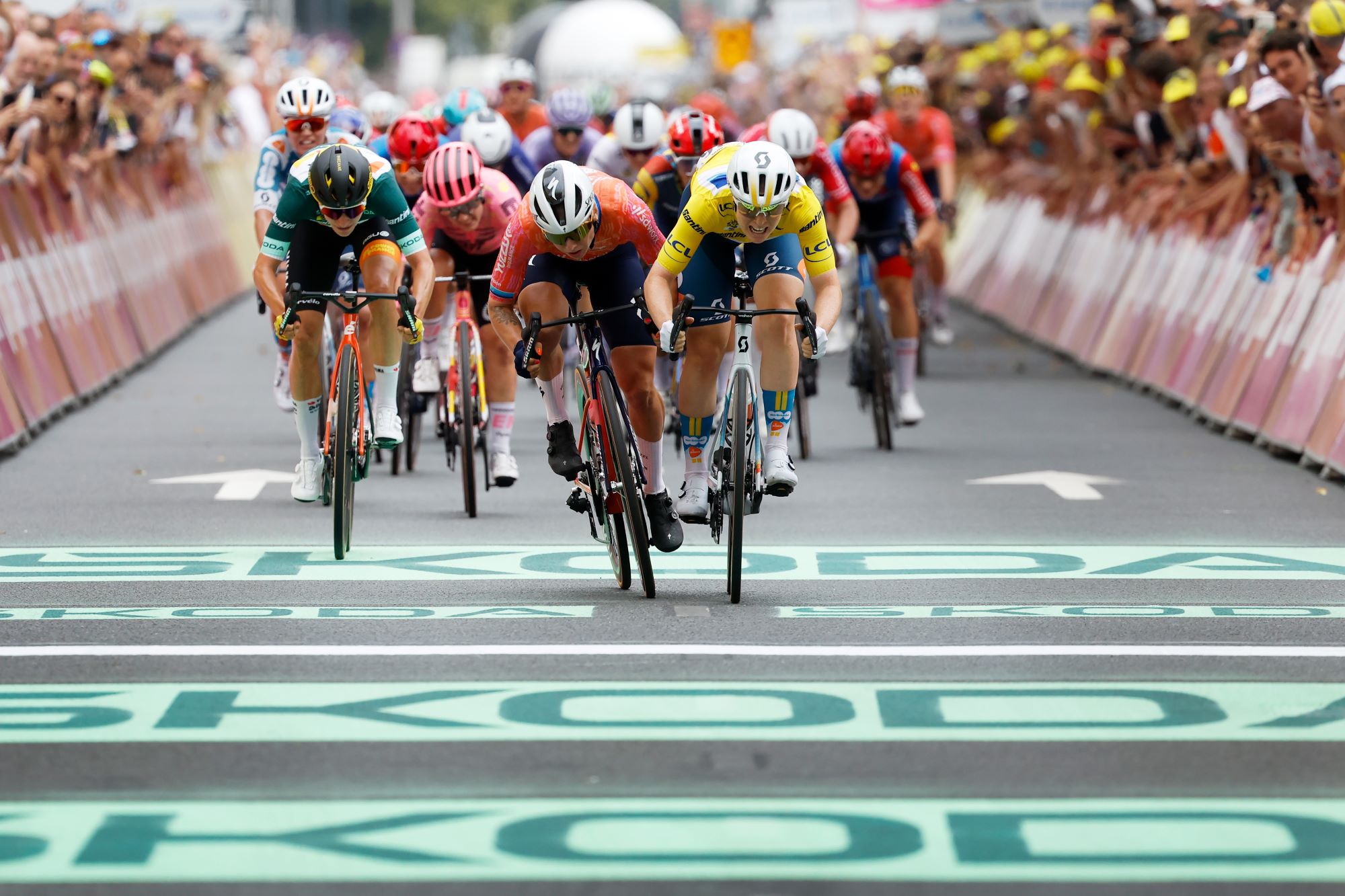 What is the new 'yellow card' system in place at the Tour de France Femmes?
What is the new 'yellow card' system in place at the Tour de France Femmes?Barbara Guarischi becomes first rider to receive booking after yellow card trial brought in by world governing body
By Tom Thewlis Published
-
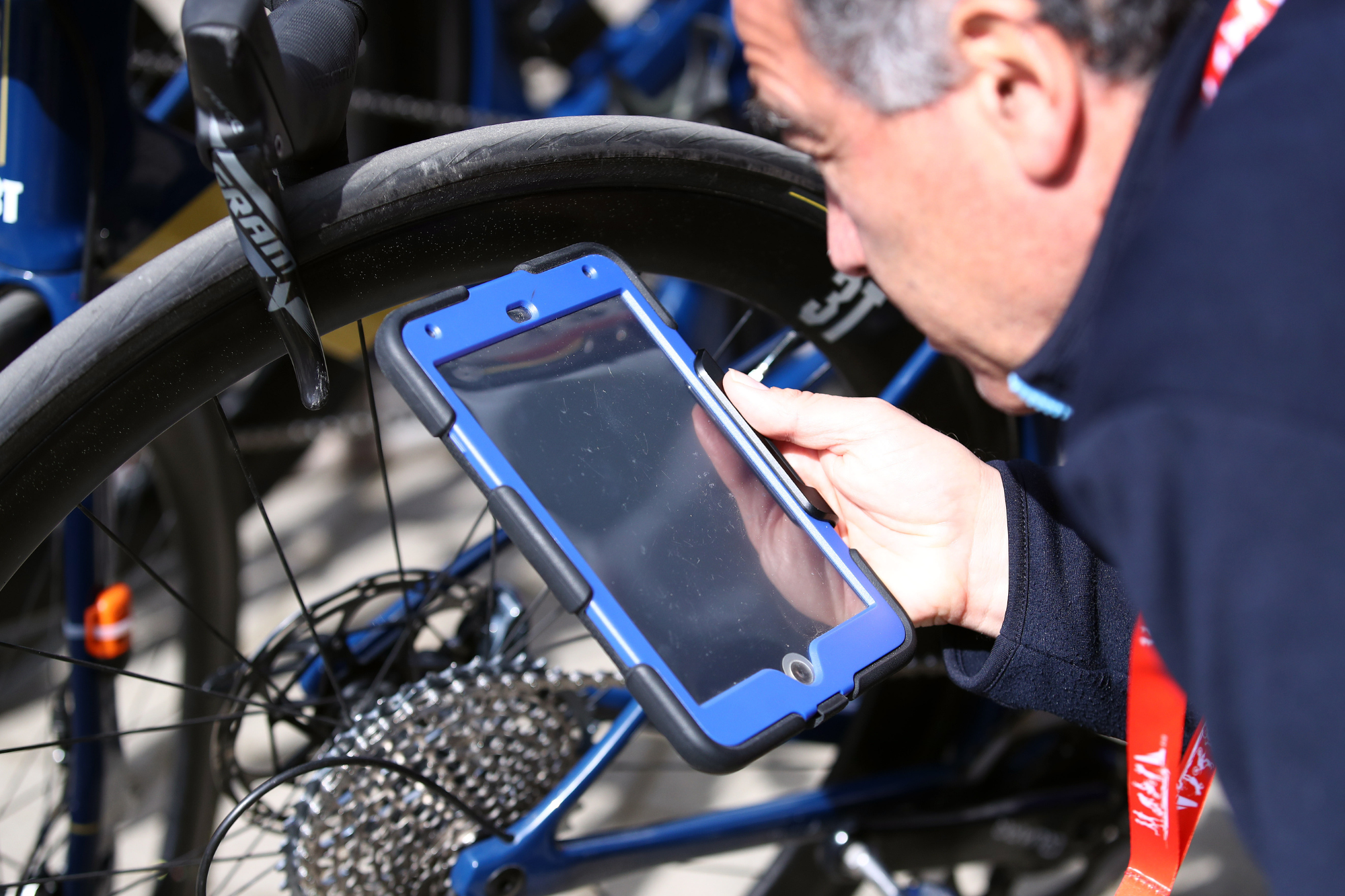 'We are not afraid': UCI to pay for 'qualified information' relating to possible motor doping
'We are not afraid': UCI to pay for 'qualified information' relating to possible motor dopingPresident David Lappartient also says that he is "not afraid to to catch a top rider" should they be using motored assistance inside their bike
By Chris Marshall-Bell Published
-
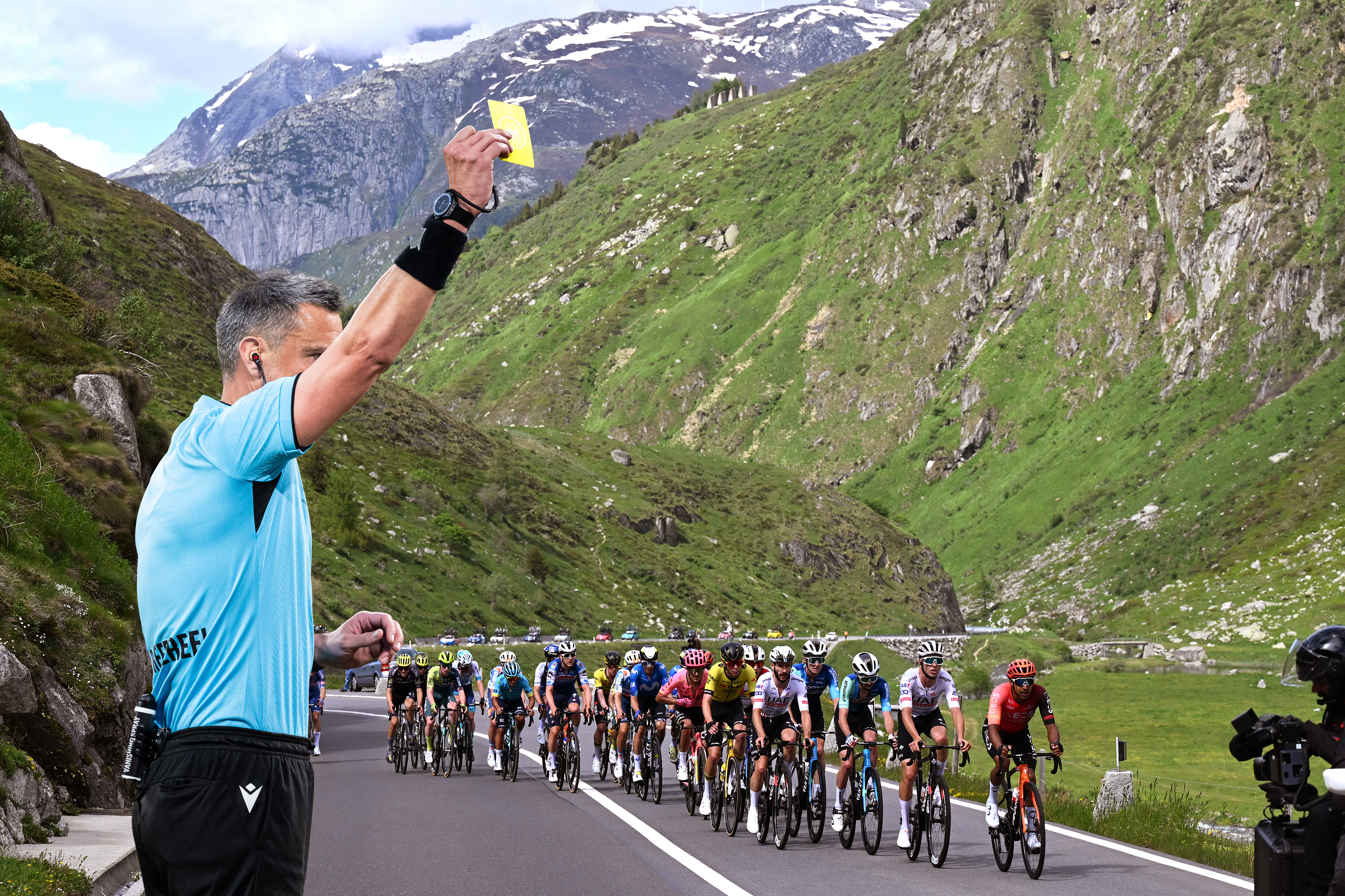 Yellow cards to be trialled in pro cycling amid raft of UCI rule changes
Yellow cards to be trialled in pro cycling amid raft of UCI rule changesThe way time gaps are calculated is also set to be altered
By Adam Becket Published
-
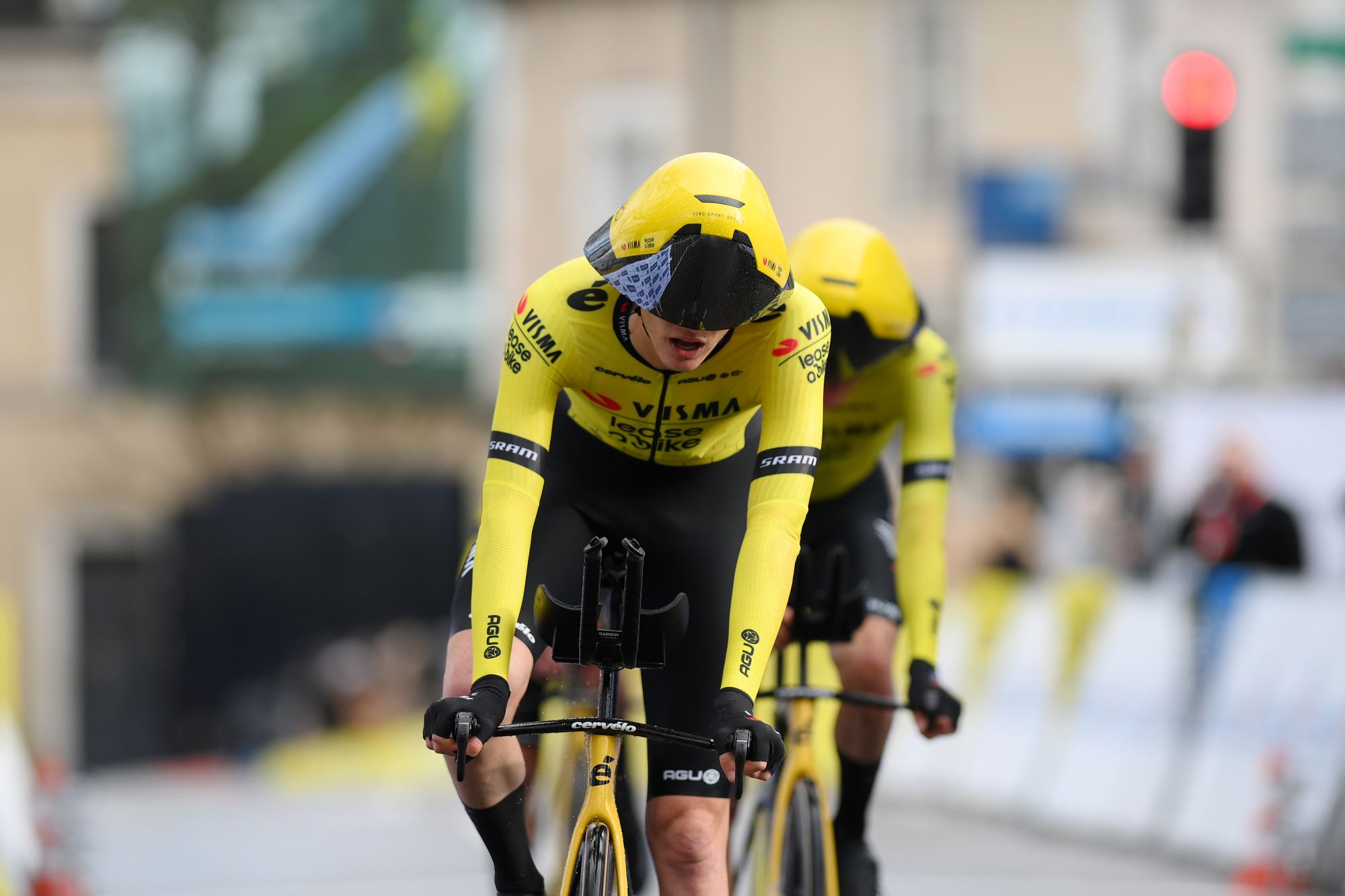 'All the conditions are met, then it's questioned again' - Visma-Lease a Bike bemoan UCI review after 'a lot of money' spent on development of Giro helmet
'All the conditions are met, then it's questioned again' - Visma-Lease a Bike bemoan UCI review after 'a lot of money' spent on development of Giro helmetTeam reacts to governing body statement on Tuesday, day after new helmet was debuted
By Tom Thewlis Published